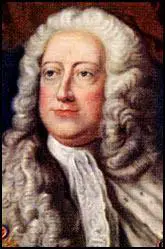George I

George, the eldest son of Ernest August, Elector of Hanover and Sophia of Bohemia, was born in 1660. He was also the great-grandson of James I. In 1682 George married his cousin, Sophia of Zell. The couple had two children, George (1683-1760) and Sophia (1688-1757).
In 1714 Queen Anne became very ill. The true heir to the throne was James Stuart, the son of James II. Many Tory ministers supported James becoming king. However, James Stuart was a Catholic and was strongly opposed by the Whigs. A group of Whigs visited Anne just before she died and persuaded her to sack her Tory ministers. With the support of the Whigs, Queen Anne nominated Prince George of Hanover as the next king of Britain.
At first, George was not sure that he wanted to become king. Although Hanover was only a small area, he had complete power over his subjects, whereas in Britain he would have to share power with Parliament. George knew that being a king in Britain did not always provide long-term security. He was only too aware of what happened to Charles I and James II when they lost the support of Parliament.
However, George's advisers in Hanover recommended that he accept the offer. They pointed out that as king he could use his new power and influence to help protect the independence of Hanover from its aggressive neighbours.
When George arrived in England, he knew little about British politics nor could he speak very much English. George therefore became very dependent on the Whigs who had arranged for him to become king. The most important of these was Robert Walpole who became George's Prime Minister.
George never learnt to speak English and spent much of his reign in Hanover. When he died in 1727 he was succeeded by his son George II.
